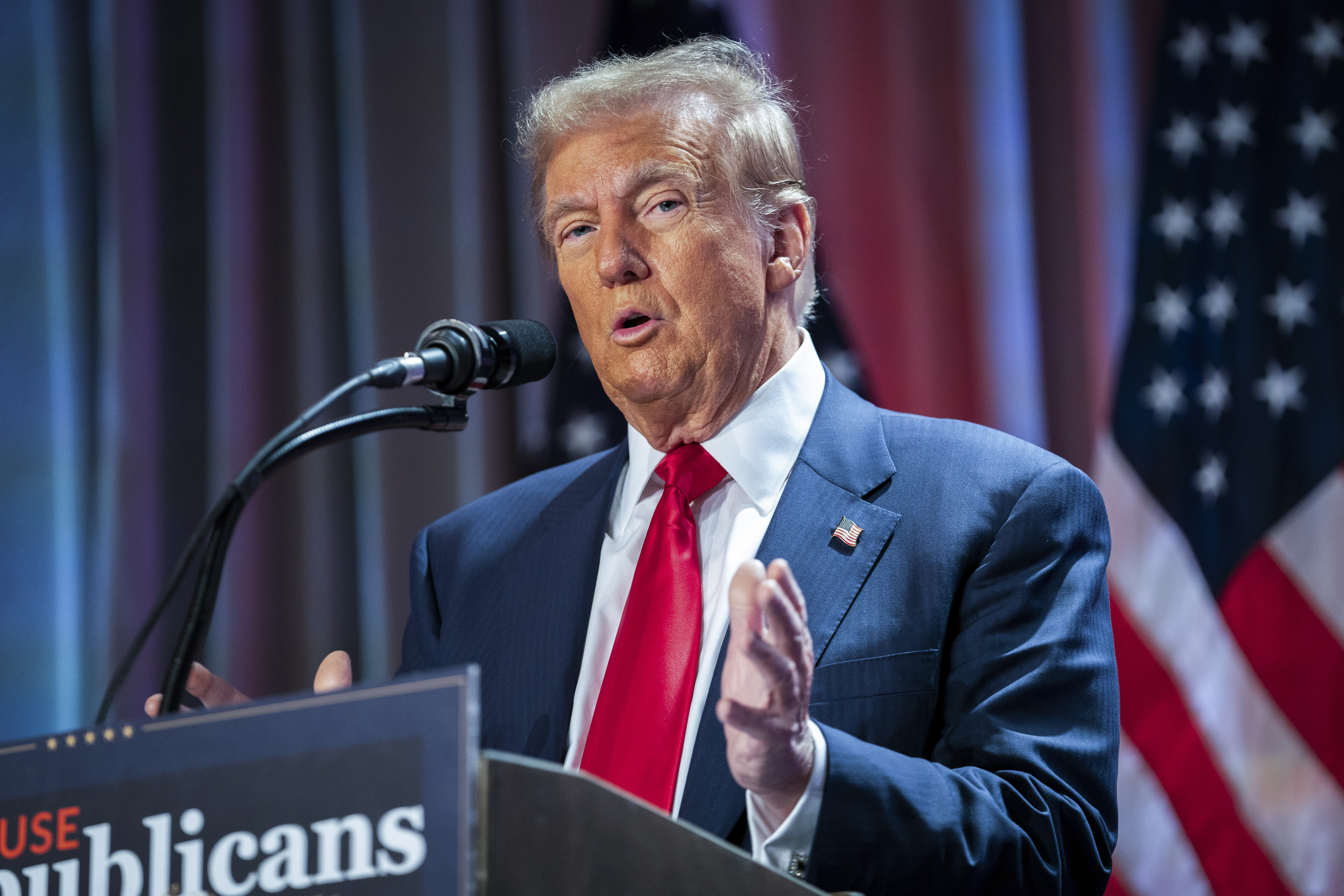Congress
How a Trump sign could pave the way to Congress

ALBANY, New York — A 42-year-old boxer in upstate New York is leveraging the 100-foot sign he built to support Donald Trump — and allies like Roger Stone and the president-elect’s son — into a bid to succeed Rep. Elise Stefanik.
The man behind the sign, Anthony Constantino, wants Stefanik’s House seat and has been meeting GOP leaders with the power to select a nominee to replace her.
Constantino, who founded the printing company Sticker Mule, has ties to the Trump family. He told Blue Light News he ate dinner with Donald Trump Jr. earlier this year and visited Mar-a-Lago in November. He’s also received support and unpaid advice from Stone, a longtime Trump ally.
Now, Constantino is applying the recognition he received for his enthusiastic Trump support — and a public fight with local officials over his sign — to a House run. His platform, in large part, is to counteract hatred toward the incoming president.
“The country needs more people like President Trump, Elon Musk, people like myself who don’t aspire to be politically involved people, but just want to do what’s right for the country,” Constantino said in an interview.
A special election for the sprawling, heavily Republican district — which runs from the outskirts of Albany to the Canadian border — has not been called, and Stefanik remains a House member as her nomination to the U.N. is pending Senate confirmation. A direct endorsement in the race from Trump or Stefanik would likely be one the biggest factors for county leaders in making their selection. It would also be highly coveted by the candidates, but many have kept a low profile — in part out of deference to Stefanik and to not be seen as over eager.
“Why would you not want to hear the input from Team Elise and Team Trump?” Fulton County GOP Chair Susan McNeil said. “Of course we want to hear from them.”
Trump has dipped into the House GOP conference to stock his administration — selections that will trigger special elections in states like New York and Florida. Those moves will temporarily shrink his party’s already narrow majority, but the incoming president could solidify his hold over the party by choosing favored successors for those lawmakers.
In the past, Trump has had a mixed record with his political endorsements — with sometimes disastrous consequences for Republicans. He backed scandal-scarred Senate candidates like Alabama’s Roy Moore and Herschel Walker in Georgia; both lost to Democrats.
Constantino, who has a flair for self-promotion on conservative podcasts and cable TV, fits into the mold of a new wave of candidates who’ve emerged in the Trump era. He has a near-constant presence on X where he shares his media appearances, highlights his business and promotes charitable causes.
If he becomes the nominee, he would leapfrog stalwart Republicans who are also vying for Stefanik’s seat. The group includes state lawmakers, a former House candidate and the party’s 2022 nominee for U.S. Senate, Joe Pinion. But Constantino has taken a more circuitous route to both the campaign and politics, underscoring how Trump has upended the regular order of the Republican Party — even on a local level.

Trump’s transition team did not respond to messages seeking comment on a possible endorsement.
Constantino is a former Democrat, having registered in the party when a high school friend was running for office in Albany. He recently changed his registration to the GOP, but one Republican county chair told Blue Light News they did not see the party conversion as a deal-breaker.
All of the prospective candidates are pro-Trump, in keeping with a party that has been subsumed by the president-elect’s base. Stefanik, who was initially critical of Trump, zealously defended him during his first impeachment trial.
But Constantino fits into a different category entirely with his support of Trump. Compared to his rival Republicans, he would likely draw the most national attention.
The boxing pro gained fame among Trump supporters over the summer when he constructed a giant sign in the upstate New York city of Amsterdam in support of the GOP presidential nominee. Constantino said he was moved to do so after the attempt on Trump’s life at a Pennsylvania rally.
“One of the biggest problems in the country is anti-Trump hate and hatred toward Trump supporters,” Constantino said.
The sign led to controversy, and the city’s Democratic mayor sought a court order for it to be removed on the grounds it was too distracting for drivers. Constantino’s subsequent fight with the local government turned him into an overnight star with Trump’s MAGA base — and with the incoming president. Stone took notice and reached out, and Constantino received a letter of support from Trump himself. He later dined with Don Jr.
A state court ultimately sided with him over the sign, allowing it to stay up in time for a party. The mayor, Michael Cinquanti, did not return messages seeking comment.
The dispute with municipal bureaucrats and elected officials brought Constantino attention from conservative media outlets like Newsmax and Fox News. Stone, who has been active in New York politics over the years, praised him on a podcast, comparing him to Trump and Ronald Reagan.

“I would argue that your lack of political experience is not a negative, it’s actually a plus,” Stone told him. “This is what the Founding Fathers actually envisioned.”
Stone did not return messages seeking comment. But Constantino — who acknowledged “there is a mixed opinion about Roger” — is taking advice from the notorious Republican operative whose 40-month prison sentence for obstruction was commuted by Trump in 2020.
“Roger appreciated what I did with the sign,” he said. “I got to know him through that. He’s been one of my biggest advocates.”
Constantino founded Sticker Mule, a company that sells customized stickers, labels and packaging in 2010. He employs more than 1,200 people and is based in Amsterdam, an upstate city about 40 minutes west of Albany. The majority of the company’s workers are based in upstate New York, but it also has a presence in Italy to service the European market. In 2022, Constantino became a professional boxer. He has a 4-1 record, which includes three professional fights, but has put his fighting career on hold.
Entering the political ring, of course, is a different type of challenge. He formed a campaign committee this month and, if he’s not tapped by local Republican leaders to run in the special election, plans to run outright for the GOP nomination in the 2026 election.
Constantino will fund his campaign with $2.6 million he said was earned when investing in the electric vehicle company Tesla — stock purchased when the share price dipped after Musk bought Twitter. Constantino posted a screenshot purporting to be his brokerage account as evidence he has the money.
Republican county chairs in the district are not expected to make their decision until after Stefanik receives Senate confirmation. Still, some local GOP leaders are intrigued by Constantino’s unusual path to politics.
“Like millions of Americans he’s become politically aware following Donald Trump — and a new brand of politics,” Saratoga County Republican Chair Joe Suhrada said.
Congress
Republicans sit tight as Trump pushes for mail voting crackdown
President Donald Trump is pushing Congress to end mail voting as Americans have come to know it. So far, Republican lawmakers aren’t heeding his calls.
Trump has long railed against the expansion of vote-by-mail, arguing despite scant evidence that it is rife with fraud and suggesting it was responsible in part for his 2020 election loss. Since retaking office, he has repeatedly called for action — most recently Monday night to reporters on Air Force One.
“Why would you want mail-in ballots if you know it’s corrupt?” Trump said. “It’s a corrupt system.”
But other Republicans don’t see it that way — many of their own voters have voted by mail consistently for decades. So far, the type of blanket ban on mail voting Trump wants has not gained traction on Capitol Hill as GOP lawmakers counsel for a more targeted approach.
“I support the use of mail-in voting,” said Rep. Mike Lawler, a New York Republican facing a tight reelection contest. “The idea that some states just mail out ballots without any requests is absurd, but the use of mail-in balloting, I do not have an objection.”
A sweeping elections bill the House passed last week, the SAVE America Act, included strict proof-of-citizenship requirements for voter registration and new photo-ID rules for casting ballots.
But it did not address voting by mail — even though Trump publicly called for a crackdown in a Truth Social post just three days before the vote: “NO MAIL-IN BALLOTS (EXCEPT FOR ILLNESS, DISABILITY, MILITARY, OR TRAVEL!)”
Behind the scenes, the White House pushed to include language in the bill that would prohibit mail-in voting, according to three people granted anonymity to discuss the issue. But that risked losing support from some Republicans and endangering the bill’s ability to pass the narrowly divided House, and it was ultimately left out.
A White House website touting the bill still lists “No Mail-in Ballots” as one of its features.
Asked about the discrepancy, White House spokesperson Abigail Jackson said in a statement that Trump “has repeatedly urged Congress to pass the SAVE Act and other legislative proposals that would establish a uniform standard of photo ID for voting, prohibit no-excuse mail-in voting, and end the practice of ballot harvesting to ensure the safety and security of our elections.”
Several House Republicans said in interviews over the past week they sympathized with Trump’s push to crack down on mailed ballots, but many couched their words carefully. A number hail from states like Florida that have a long history of expansive mail voting and little evidence that the practice has been abused.
Even as the president pushed to curtail mailed ballots, the RNC and state Republican parties worked to take advantage of the practice during the 2024 campaign to increase voter turnout — and they are planning to do much the same in 2026.
Instead, many congressional Republicans insist that Trump is really targeting states like California, Oregon and Utah that conduct their elections almost entirely by mail. Others emphasize the need for exceptions, as Trump has acknowledged, for cases of illness, military service and other reasons they view as legitimate, as well as the other election changes Trump is backing.
“We have to be very cautious about mail-in-ballot voting,” Rep. Cory Mills (R-Fla.) said in an interview. “But I think that if we get the registration process correct, then that’ll fix a lot of this.”
GOP Rep. Byron Donalds, who is running for governor in Florida, said his state’s laws should serve as a model for the country. Florida voters have to request a mail-in ballot and include identification. But there is no limitation on who can request a mail ballot along the lines of what Trump is proposing.
“In Florida, we treat ballots like they’re evidence in a trial,” Donalds said. “Other states need to follow that. … I think that’s what the White House is referencing. You just can’t have ballots out there in the ether.”
Another elections bill moving through the House, the Make Elections Great Again Act, does include provisions dealing with mail voting — including language aimed at preventing “ballot harvesting” where third parties collect ballots on voters’ behalf. It would also ban “universal” vote-by-mail where ballots are sent to all registered voters — but would not narrow who could request a mailed ballot.
That policy appears to be more in keeping with what most GOP lawmakers envision for an elections overhaul — and they insist that is what Trump in fact supports.
“If you’re sick and you can’t get to the polling [place], he wants you to have a ballot. If you’re a military member, he wants you to have a ballot,” Rep. Derrick Van Orden (R-Wis.) said of the president. “Who he doesn’t want to have a ballot is the illegal alien that registered or even a lawful alien who got a driver’s license to be registered to vote and get a mail-in ballot.”
The MEGA Act is sponsored by House Administration Committee Chair Bryan Steil (R-Wis.) and was the subject of a recent hearing. But it has not yet moved through the panel or been scheduled for the House floor.
The SAVE America Act also appears likely to stall in the Senate, despite a conservative effort to utilize a so-called talking filibuster to skirt Democratic opposition there.
Trump appears to be recognizing the obstacles to his elections agenda on Capitol Hill.
In a Friday Truth Social post, he suggested he would take executive action to implement “Voter I.D. for the Midterm Elections, whether approved by Congress or not,” while also mentioning “No Mail-In Ballots, with exceptions for Military, Disability, Illness, or Travel.”
But to Republicans like Lawler, who voted for the SAVE America Act and is facing a tough reelection fight this year, the GOP’s efforts going forward would be best spent making sure “people get out and vote.”
“If they vote by mail, if they vote early, if they vote on Election Day, the objective is to get them out and vote,” he said.
Meredith Lee Hill contributed to this report.
Congress
Republicans worry shutdown will overshadow Trump’s State of the Union
President Donald Trump is barreling ahead with the first State of the Union address of his second term, despite concerns among Republicans that it’s set to hit during a partial government shutdown.
The speech, set for 11 days from now, is poised to land in the middle of a funding lapse at the Department of Homeland Security – the product of a standoff with Democrats over immigration enforcement that the White House had hoped to avoid. Behind the scenes, some administration officials and senior Capitol Hill Republicans are quietly fretting about the optics, according to six people granted anonymity to describe private conversations.
The concerned Republicans believe it would be less than ideal for Trump to stand in the well of the House and declare that the state of the union is strong when a critical part of the federal government remains shuttered.
“It doesn’t exactly scream ‘a functioning GOP trifecta,’” said one House Republican granted anonymity to speak candidly.
Asked whether postponing the address was under discussion, a senior White House official said Friday, “Not as of yet.” Senior Hill Republicans believe the president is full steam ahead as well. In 2019, Trump publicly battled with then-Speaker Nancy Pelosi for more than a week over whether to delay his State of the Union address during an earlier government shutdown. He eventually relented.
Republicans expect Speaker Mike Johnson, who is responsible for extending the formal invitation to the president to address a joint session of Congress, not to delay the speech unless the White House specifically asks.
The latest shutdown, which will begin when DHS funding lapses overnight, is expected to drag on until at least the week of Trump’s Feb. 24 State of the Union speech because the White House and Senate Democrats appear to be far apart on how far to rein in Trump’s immigration enforcement activities as part of a funding agreement.
Both sides are continuing to negotiate, but lawmakers left Washington Thursday for a week-long recess with little expectation they would be called back early. The address is scheduled for one day after lawmakers return to Capitol Hill.
White House officials and senior Hill Republicans have been eager for Trump to use the prime time address to tamp down a swirl of negative headlines over the past few weeks, from the fatal shootings by federal immigration agents in Minnesota to the release of the files of the late convicted sex offender Jeffrey Epstein. They instead want to focus on the GOP’s economic messaging heading into the midterms.
Some Republicans also see it as an opportunity to blame Democrats for the DHS funding lapse, which impacts TSA baggage screeners, who will work without pay, FEMA and the Coast Guard.
“President Trump has been, and always will be, on the side of the American people,” White House press secretary Karoline Leavitt said in a Fox News interview Friday. “He wants our government to remain open, and unfortunately, it appears that Democrats are barreling our government towards another shutdown for political and partisan reasons.”
Among the considerations for Republicans is how difficult Democrats plan to make things for Trump during the speech itself. Senate Democrats are having discussions about whether to boycott the event and talked it over during a closed-door lunch this week, according to two people granted anonymity to share details of the private conversations. Some members of the caucus are currently expected to attend, though a swath is undecided.
House Minority Leader Hakeem Jeffries on Friday declined to say whether he believed the speech should go forward during a DHS shutdown.
“That’s an open question,” he told reporters. “We’ll have more to say about that next week.”
Jeffries advised Democrats during a private leadership meeting earlier this week that his members should either sit in “silent defiance” or attend alternative programming, according to two people granted anonymity to describe his comments.
Heckling has become increasingly common from a president’s political opponents during State of the Union speeches.
Johnson pleaded with his own members to maintain decorum during former President Joe Biden’s 2024 State of the Union appearance, only for several House GOP hard-liners to openly taunt him. During Trump’s address to Congress last year, Democrats showed up with signage and jeers, with multiple members walking out either on their own accord or at the insistence of Capitol Police.
Rep. Al Green (D-Texas), who stood up to yell at the president at the very beginning of Trump’s speech last year, was later censured by the House for his actions.
Asked Thursday whether he would attend this year’s State of the Union address, Green said, “I’m not making an announcement right now.”
Eli Stokols and Diana Nerozzi contributed to this report.
Congress
Meet the YOLO Republicans: Lawmakers with nothing to lose are threatening Trump’s grip on Congress
President Donald Trump spent the past year using fear and intimidation to keep Hill Republicans in line, with considerable success. Now those tactics are starting to lose their bite — thanks to a small group of Republicans with nothing to lose.
The reasons why this handful of GOP lawmakers feel empowered to spurn their president and their party vary. But they are launching mini-rebellions with increasing frequency. It’s causing headaches for party leaders who want to keep tight control of the legislative agenda in an election year and anxiety among rank-and-file Republicans who are facing intense pressure to stick with Trump.
“Some people live in fear,” said Rep. Don Bacon, a retiring Nebraska Republican who was at the center of a crucial episode this past week, where he and two colleagues joined with Democrats to force House votes on Trump’s controversial tariffs.
When a vote to overturn his Canada levies came to the floor Wednesday, “I was in the cloakroom, and I heard people say, ‘I hate tariffs,’ and then voted” to leave them in place, Bacon recalled. Were it not for threats of retaliation from Trump and a heavy White House lobbying campaign, he estimated “30 or 40” Republicans would have broken ranks.
In the end, only six did. But thanks to the thin margins in both chambers — especially the House — a few steel-spined lawmakers can have an outsized impact. That’s a change from the dynamics in Trump’s first term, when many House Republicans weren’t fully on board with the president’s MAGA agenda, but the GOP had a much larger majority to work with.
Just ask Rep. Thomas Massie of Kentucky, who has gone from an occasional annoyance to Republican leaders to a persistent problem in the 119th Congress.
“The margin is razor-thin, so on any given day, I would just need one or two of my own co-conspirators to get something done,” Massie said in an interview before predicting the situation will only get worse for Trump.
“The retirement caucus is growing,” he said, referring to the dozens of members not seeking reelection to the House. “Once we get past March, April, and May, which contain a large portion of their Republican primaries, I think you’re going to see more defections.”
Those who have not defected are losing patience with their colleagues, with many arguing it is only hurting the GOP’s chances in the upcoming midterms.
“Certainly, I respect their right to be independent,” said Republican Rep. Buddy Carter, who is running for Senate in Georgia. “But you know, this is a team game. We got to remember that.”
One House Republican who was granted anonymity to speak candidly complained about a faction that “just wants to go rogue” while putting colleagues in a politically difficult spot — such as with the tariff vote this week.
“Those guys might lose now,” the lawmaker said of the House GOP’s most vulnerable members.
As voting was underway on the tariff measure this week, Trump publicly threatened to support primary challengers and enact other “consequences” against the members who didn’t fall in line. To some degree it worked — predictions of a mass GOP jailbreak didn’t materialize.
But enough members with some political insulation defected, allowing the measure to advance through the House and onto the Senate, which is likely to approve it and set up a Trump veto. Bacon and Rep. Dan Newhouse of Washington are retiring, freeing them from concerns about primary threats.
Meanwhile, Reps. Brian Fitzpatrick of Pennsylvania and Jeff Hurd of Colorado are in competitive districts that Republicans can’t afford to lose, putting pressure on the duo to show independence from their party. Rep. Kevin Kiley’s California district got blown up as part of Trump’s redistricting war. And Massie has long been accustomed to being at odds with party leaders, with his campaign to pry open the Jeffrey Epstein files sparking open warfare with the White House.
Some have doubts that a larger group of Republicans will ever break dramatically with Trump, given his durable popularity with the party base and the need for GOP candidates even in purple districts to appeal to the president’s loyalists.
One test will come later this year when Trump hits the midterm campaign trail, said Sam Geduldig, a lobbyist at CGCN Group and former House leadership aide.
“I would be surprised if a candidate didn’t want him at a rally, and that speaks to Trump’s strength,” he said. “If he can do that, it says a lot. In 2006, no one wanted [former President] George W. Bush in their district — not in conservative districts, not in moderate ones. If you’re measuring him against modern Republican presidents, he looks strong by comparison.”
Over in the Senate, Trump already has a fraught relationship with some GOP senators, like Maine’s Susan Collins and Alaska’s Lisa Murkowski, and there is generally a stronger culture of lawmaker independence. But Trump’s decision to essentially send Sen. Thom Tillis of North Carolina into retirement has introduced a new wild card in the chamber’s dynamics.
Tillis announced he would not seek reelection after voting to oppose Trump’s signature “big, beautiful bill” and warning the Medicaid cuts in the party-line policy package would be a political death knell for the GOP. Now Tillis is frequently speaking out against Trump and is single-handedly blocking his Federal Reserve nominees until a Justice Department investigation into Fed Chair Jerome Powell is resolved.
Some members are also eyeing GOP Sen. Bill Cassidy of Louisiana as a freer agent after Trump went ahead and endorsed an opponent in the May 16 primary. Asked about Trump’s threats to lawmakers, Tillis suggested they could easily backfire.
“I still maintain a good relationship with him … but I think we need to check our passions at the door,” he said this week.
Hurd, the Colorado moderate who voted to cancel the Canada tariffs and is facing a more conservative primary challenger, said he would “let the president’s statement speak for itself.”
But Hurd prevailed in 2024 without Trump’s endorsement and is in a competitive enough district that Trump can’t afford to meddle too much. The district was decided by 546 votes in 2022, when GOP Rep. Lauren Boebert narrowly held onto the seat.
“If they want to come to a district where Trump is underwater and push for tariffs in an agriculture- and manufacturing-heavy area, fine — that’s not going to work,” said a person granted anonymity to candidly discuss party strategy. “If they want to lose the majority and play in these primaries, then go ahead.”
Speaker Mike Johnson, meanwhile, has his hands full just keeping his majority intact. He currently can afford to lose only a single GOP member on party-line votes, and while upcoming special elections could boost that margin slightly, things are likely to remain super tight.
Johnson this week said he had urged one Republican battling health issues, Rep. Neal Dunn of Florida, to stick it out and finish his term amid concerns he might resign early.
Dunn declined to comment on his plans, but a close friend of his, Rep. Joe Wilson (R-S.C.), said he had jokingly told Dunn he would like to be helpful amid all the floor unrest.
“I did offer to carry him into the chamber,” Wilson said.
Jordain Carney, Mia McCarthy and Alex Gangitano contributed to this report.
-

 The Dictatorship1 year ago
The Dictatorship1 year agoLuigi Mangione acknowledges public support in first official statement since arrest
-

 Politics12 months ago
Politics12 months agoFormer ‘Squad’ members launching ‘Bowman and Bush’ YouTube show
-

 The Dictatorship5 months ago
The Dictatorship5 months agoMike Johnson sums up the GOP’s arrogant position on military occupation with two words
-

 Politics12 months ago
Politics12 months agoBlue Light News’s Editorial Director Ryan Hutchins speaks at Blue Light News’s 2025 Governors Summit
-

 Politics12 months ago
Politics12 months agoFormer Kentucky AG Daniel Cameron launches Senate bid
-

 The Dictatorship1 year ago
The Dictatorship1 year agoPete Hegseth’s tenure at the Pentagon goes from bad to worse
-
Uncategorized1 year ago
Bob Good to step down as Freedom Caucus chair this week
-

 Politics10 months ago
Politics10 months agoDemocrat challenging Joni Ernst: I want to ‘tear down’ party, ‘build it back up’





